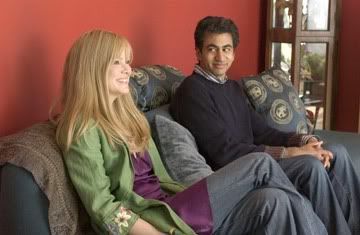

Archive: "The Namesake" (2007)
Gogol Ganguli (Kal Penn) may not be a name you would too favorably want on a work resume, or anywhere, written or spoken. Even if a name causes such embarrassment, what if it was something your parents wanted? When Gogol's mother gives birth to him, the doctor asks for a name; she and her husband are waiting for the grandmother to choose. It is her responsibility to choose what they call the "good name," rather than the "pet name," which they had already chosen to be Gogol. With no "good name" in sight, they put the name Gogol on the birth certificate. This seemingly simplistic idea about a name is the beginning and one of the recurring themes behind Mira Nair's "The Namesake," a marvelously moving cross-cultural family saga that tells a deep story spanning a generation.
Ashima walks downstairs to meet some visitors. Before she steps into the living room, however, she notices their shoes lined up against the wall. One of these pairs of shoes has "Made in the USA" written on the inside, and so, she puts them on and simply looks down admiringly at these shoes that surprisingly fit. It's a rather simple scene, but one that's all the more poignant with its kindness and innocence. It opens up the first half of the movie that deals with Ashima in her arranged marriage; it was her to-be husband, Ashoke Ganguli, and his parents waiting in the living room. Together this newlywed couple moves from Calcutta to New York and eventually fosters a family. Years pass and we are given insights into their warm relationship that has the genuine feel of someone newly arriving to a country; it's this early part of the movie that shows the most sincere affection seen in the entire film.
The reason behind Gogol's eccentric name is explained when Ashoke has a talk with his now teenage son. Gogol and his sister both are very American in comparison to their aging parents. The two of them sigh in boredom and exasperation during their family trips back to India to see the extended Bengali family. Interestingly enough, though, it is actually here where Gogol decides to study architecture after being inspired by the Taj Mahal. From here, more years pass, and Gogol is studying architecture under a new name of Nick. His father's favorite author was Nikolai Gogol, and therefore, we get Gogol's original name, and now, even his new name derived from Nikolai. The real significance of this name, however, is not explained until later when we see the connection to the very opening scene of Ashoke being in a train crash.
Throughout the movie, there are many referential flashbacks such as this that connect Gogol's life with parallels to his parents' life, such as Gogol's eventual marriage and even the subtle moment when Gogol steps into his father's shoes. This movie is beautifully filmed and uses dulled colors during different scenes simply for emotional resonance. The culture of India itself, with the lavish customs and all, provides a gorgeous backdrop for such a family journey to take place. With this, the movie is able to artfully depict the immigrant experience in a more affecting manner.
Gogol appears to be content with his girlfriend, Maxine, whose parents accept him warmly. He lives in the city, and therefore has become more detached from his family. At this point, Ashima feels like she's losing her own family all over again. It becomes obvious that Gogol simply needs to appreciate his own heritage more, and we get that immediately. It's clear that although he obviously loves his parents, he doesn't always show it the right way. He is inevitably torn between his own desires and the desires of his parents. Soon enough, a tragedy hits the Ganguli family, which initiates Gogol's ultimate transformation in finding a balance between these two internal conflicts.
Although an apparent landmark in the life of this family, unfortunately it's at this point in the film that the actual storytelling becomes more disjointed than before. The entire movie is definitively episodic to begin with due to large leaps through time with gaps of years passed by; even so, the movie cruises along smoothly, but then hits a wall here. It does not ever become entirely clear why Gogol drops his girlfriend so easily once he finds out about his father's death. His newfound devotion to his family is understandable, yes, but it almost interferes and the shift seems a bit too abrupt. Gogol gets into another relationship soon after that, except it is used only like a road stop in his evolution, and thus feels too contrived.
Kal Penn has distinguished himself now as a worthy actor with this role as Gogol. Sure he's been in other stuff and has done fine in comedic roles, but this is something new for him, and he approaches it with great sincerity and tenderness. He allows his character to transform from beginning to end, eventually finding that much-needed balance between family and free will. Even though "The Namesake" takes a stumble right near the end and loses track of its storytelling direction at times, the movie still wraps up cleanly and nicely, making for a fulfilling and satisfying conclusion with an especially sad and touching final scene.





No comments:
Post a Comment